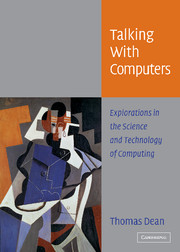Book contents
- Frontmatter
- Contents
- Preface
- Acknowledgments
- 1 TALKING WITH COMPUTERS
- 2 THE SHELL GAME
- 3 KEEPING TRACK OF YOUR STUFF
- 4 DON'T SWEAT THE SYNTAX
- 5 COMPUTATIONAL MUDDLES
- 6 GETTING ORIENTED
- 7 THANKS FOR SHARING
- 8 YOU'VE GOT (JUNK) EMAIL
- 9 MODERN ARCHITECTURE
- 10 DO ROBOTS SLEEP?
- 11 UNDER THE HOOD
- 12 ANALYZE THIS
- 13 FOREST FOR THE TREES
- 14 SEARCHING THE WILD WEB
- 15 DARWIN'S DANGEROUS ALGORITHM
- 16 AIN'T NOBODY HERE BUT US MACHINES
- Bibliography
- Index
16 - AIN'T NOBODY HERE BUT US MACHINES
Published online by Cambridge University Press: 05 June 2012
- Frontmatter
- Contents
- Preface
- Acknowledgments
- 1 TALKING WITH COMPUTERS
- 2 THE SHELL GAME
- 3 KEEPING TRACK OF YOUR STUFF
- 4 DON'T SWEAT THE SYNTAX
- 5 COMPUTATIONAL MUDDLES
- 6 GETTING ORIENTED
- 7 THANKS FOR SHARING
- 8 YOU'VE GOT (JUNK) EMAIL
- 9 MODERN ARCHITECTURE
- 10 DO ROBOTS SLEEP?
- 11 UNDER THE HOOD
- 12 ANALYZE THIS
- 13 FOREST FOR THE TREES
- 14 SEARCHING THE WILD WEB
- 15 DARWIN'S DANGEROUS ALGORITHM
- 16 AIN'T NOBODY HERE BUT US MACHINES
- Bibliography
- Index
Summary
It's difficult to work with computers for long without thinking about the brain as a computer and the mind as a program. The very idea of explaining mental phenomena in computational terms is obvious and exciting to some and outrageous and disturbing to others. For those of us working in artificial intelligence, it's easy to get carried away and extrapolate from current technology to highly capable, intelligent and even emotional robots. These extrapolations may turn out to be fantasies and our robots may never exhibit more than rudimentary intelligence and sham emotions, but I think not.
Scientific knowledge about brains and cognition has expanded dramatically in recent years and scholars interested in the nature of mind are scrambling to make sense of mountains of data. Computer software is surpassing human ability in strategic planning, mathematical reasoning and medical diagnosis. Computer-controlled robots are cleaning offices, conducting guided tours in museums, and delivering meals in hospitals. However, a lot more is at stake here than solving engineering problems or unraveling scientific puzzles.
The various claims concerning the nature of mind are complicated and hotly contested. Many of them date back thousands of years. Some are believed to threaten the moral, religious and social fabric of society. It's feared by some that if individuals believe certain claims – whether or not they are true – they will no longer be bound by prevailing social and moral contracts.
- Type
- Chapter
- Information
- Talking with ComputersExplorations in the Science and Technology of Computing, pp. 271 - 288Publisher: Cambridge University PressPrint publication year: 2004



